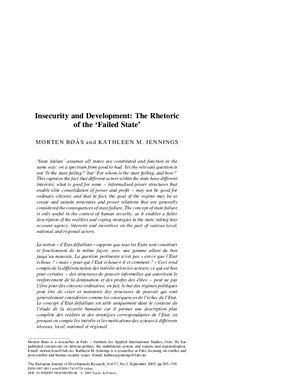12 p.
‘State failure’ assumes all states are constituted and function in the same way: on a spectrum from good to bad. Yet the relevant question is not ‘Is the state failing? ’ but ‘For whom is the state failing, and how? ’ This captures the fact that different actors within the state have different
interests; what is good for some – informalised power structures that enable elite consolidation of power and profit – may not be good for ordinary citizens; and that in fact, the goal of the regime may be to create and sustain structures and power relations that are generally considered the consequences of state failure. The concept of state failure is only useful in the context of human security, as it enables a fuller description of the realities and coping strategies in the state, taking into account agency, interests and incentives on the part of various local, national and regional actors.
‘State failure’ assumes all states are constituted and function in the same way: on a spectrum from good to bad. Yet the relevant question is not ‘Is the state failing? ’ but ‘For whom is the state failing, and how? ’ This captures the fact that different actors within the state have different
interests; what is good for some – informalised power structures that enable elite consolidation of power and profit – may not be good for ordinary citizens; and that in fact, the goal of the regime may be to create and sustain structures and power relations that are generally considered the consequences of state failure. The concept of state failure is only useful in the context of human security, as it enables a fuller description of the realities and coping strategies in the state, taking into account agency, interests and incentives on the part of various local, national and regional actors.

